Items
Tag is exactly
COVID test
-
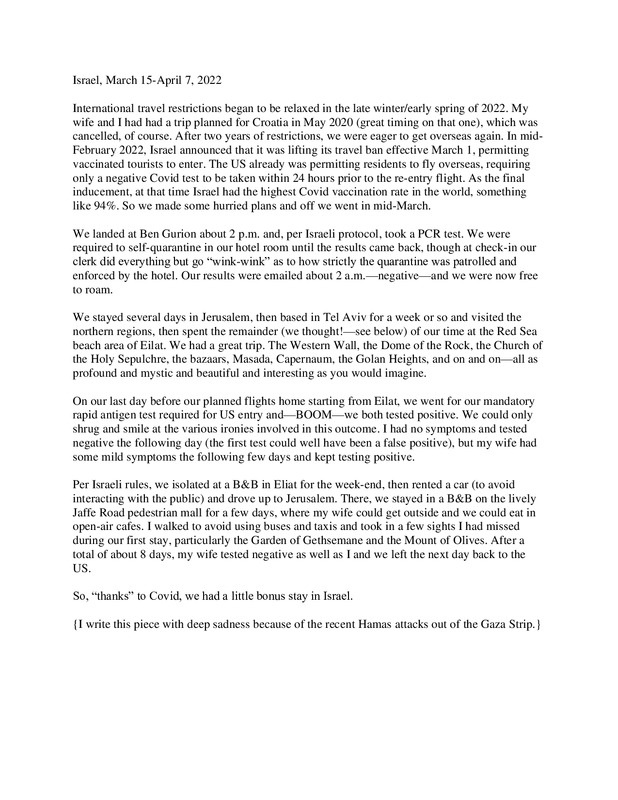 2022-05-14
2022-05-14Dealing with COVID in Israel two weeks after the lifting of the travel ban
This story relates the issues my wife and I had in dealing with Covid restrictions on a trip to Israel, just two weeks after the travel ban had been lifted. The story has no great significance except, perhaps as an example of "life is irony." While the story itself is trivial and meant to be amusing, I do share it here with a profound sense of sadness over the recent Hamas attacks and their consequences. -
2021-06-03
Traveling overseas during Covid
My wife and I decided to travel to Greece immediately after the initial lockdown and when the travel restrictions were lifted. It was a difficult decision to take such a long trip during the pandemic, and especially since we had to travel through Germany in order to get to our final destination. Restrictions varied among countries, and the fear of another lockdown before returning to the United States made our trip quite stressful. Despite the circumstances, we decided to follow through with our plans because my wife needed to get a medical procedure done, and the doctor of her choice operates in Greece. After checking and double-checking all the required travel documents, we found out that we needed to provide negative Covid tests at the airport in Chicago in order to board the plane. It was unclear whether we would need to take another Covid test in Germany and upon arriving to Greece, but we both got our tests and headed to O’Hare international airport. When we entered the airport, we couldn’t believe the long lines ahead of us. We made sure to get there 3 hours before our scheduled flight, and we waited in line so we could show proof of our test results. After a 40-minute wait, it was finally our turn. We handed in our tests and waited patiently while the lady at the desk was looking at them with a perplexed look on her face. “You can’t get on this flight”, she said. “Your tests expired 30 minutes ago. You need to get new tests”, she added. We were stunned since we had both gotten out tests the day before, and the rules stated that the tests would be valid for 24 hours. The airline employee was telling us that we had missed the 24-hour deadline by half an hour. When we realized that the rule was very strict and there was no way we could get on the plane without taking new tests, we found out that we could get tested at the airport and get the results within 20-30 minutes. We both rushed to get new tests, but we were surprised to find out that the cost was $200 for each test. That was an added expense of $400 that we hadn’t planned for, the trip was very expensive, and we also had to pay for my wife’s medical bills in Greece. It was Wednesday evening, we would arrive in Greece on Thursday evening, and my wife’s appointment at the hospital was Friday morning. If we didn’t make that flight, we wouldn’t arrive in Greece on time for my wife’s scheduled operation. We had no choice but to get tested. While all of that was happening, time was going by and there was a risk we wouldn’t make it to our flight on time. My wife got so overwhelmed and stressed out that at some point she sat on her suitcase and started crying in the middle of the airport. I gathered all my strength and patience and helped her get up and pull it together so we could run for the tests, get the results, and run back to check in. At that point I realized that we weren’t the only ones going through that situation. There was chaos around us, people arguing with employees, getting upset and shouting, other people crying, people who didn’t speak English and were trying to figure out what to do, families with kids running around frantically, and everyone was complaining that the rules hadn’t been clear. It was a huge mess, and we were in the midst of all that trying to get everything done. We were able to get on a different flight that night, and we made it to Greece safely and on time for my wife’s hospital appointment. When I reflect back, I realize that there was indeed a lack of clear rules, and the whole situation could have been avoided if the airlines had provided more accurate guidelines. I have traveled internationally hundreds of times in my life, but I had never experienced anything like that before. I understand that the situation was new for everyone involved, and when I think back, I don’t get upset about it anymore, but that was definitely one of the most stressful travels I have ever had. -
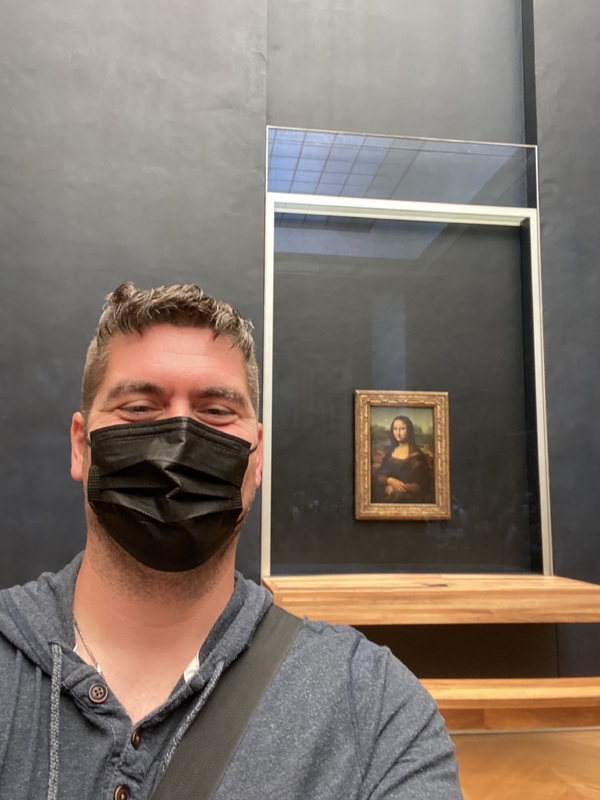 2022-06-03
2022-06-03First Student Trip After COVID-19 Pandemic Began
I have led a student global travel trip for the last 10 years at my school. Because of the COVID-19 outbreak in 2020, our trip to Australia and New Zealand was delayed/cancelled until 2021 in hopes of COVID being over by then. I had 27 students have to postpone traveling on this trip. In 2021, we came across the same restrictions, and our trip was cancelled again. As we we were planning our 2022 trip, New Zealand still had quarantine rules that would have kept us in the hotel for a week before we would get to go anywhere or do anything. Due to this, we changed our trip to one to France, Switzerland, Germany, and Austria. My students wanted to travel again, but did not know what to expect. There were still masking rules in place in a lot of the places we visited, and everyone had to take a mandatory COVID-19 test to be able to leave Europe at the end of the trip and get back into the United States. This was the scariest part because if your test revealed you were positive for COVID, you were required to stay in the country until you were negative. Everyone on the trip dreaded the day of the test because we had heard so many stories about other schools on different trips that had students who had failed the test. The trip was extremely important to me because it represented these students being able to fully restart their lives and finally be able to be kids again. This is a picture of me from the Louvre waiting my turn to see the Mona Lisa. It was taken immediately after I took a picture of all my students in front of the painting. I can see the happiness in my eyes again, getting to see students do something they love to do. -
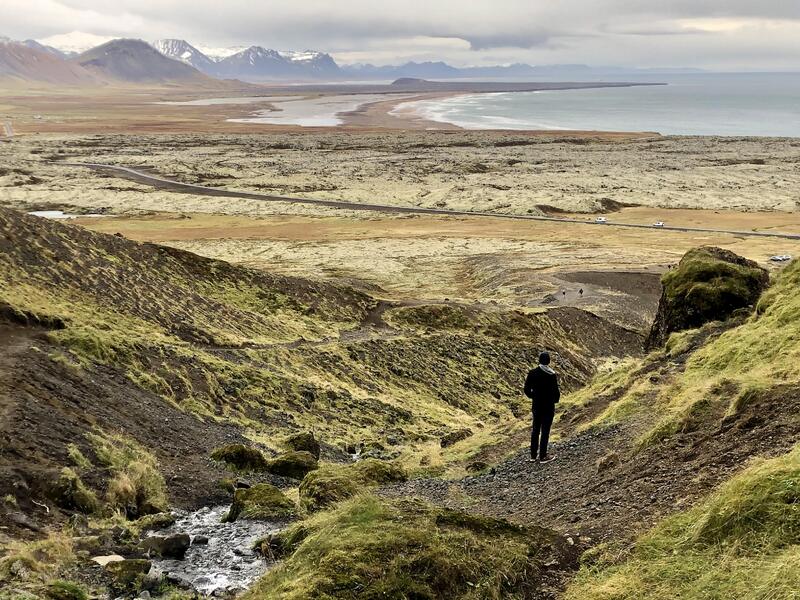 2021-10
2021-10Woodcrofts in Post-Pandemic Iceland
First, let me say that I am not a big traveler. I was never bitten by the travel bug, and I had no strong desires to see the world. A bit controversial, but I remember feeling even just a few months of lockdown during the COVID-19 pandemic that I needed to get out. I needed to escape my house, not because being quarantined and working from home with my husband was problematic or bad as far as our being with one another 24/7, but I just felt very confined and small, almost suffocated. There’s a difference, I think between choosing not to travel or leave your house and not being able to leave your house because of guidelines and the risk of spread illness. My husband and I had planned a trip to go to Iceland in September of 2019, but I just started a new job and couldn’t get time off that soon after starting, so we pushed it off to – as luck would have it – March 2020. In fact, it was planned for about a week or so after the entire world shut down and said “stay home.” At that point, we were “refunded” our tickets and accommodations, and were in this place of not know when or if this trip would happen. By refunded, I mean that the airline gave us a credit for the amount needing to be spent within a year after this date. So we felt in a bit of a dilemma and unsure of what to do. The news of the pandemic and the guidelines were – understandably - constantly shifting, and we were looking at international travel, so we had to frequently check the U.S. travel restrictions as well as Iceland’s restrictions and compare. Even then, restrictions fluctuated, at some points saying travel was allowed on one end, at others, if you test positive you may have to stay there for your entire quarantine period in a designated space away from others, extending your stay for potentially a month. It was a force to even consider planning. Finally, the stars aligned, and we were able to schedule our trip for October 2021, two years later that we had originally planned, but we were going and excited, if a bit nervous. I remember from the day we picked the flights looking up the travel restriction websites every day. I bookmarked the U.S. and Iceland’s sites to check to see if anything had changed in terms of guidelines or cancellations. We knew that we needed to schedule a covid test about 1 week prior to the flight and upload and bring proof of a negative result for the airline. We had been vaccinated, so we had to bring our cards for verification at customs. We also at that point, scheduled our return flight’s covid testing in Iceland to make sure that we had another negative result so we could come home. It was incredibly stressful trying to schedule all this, some sites were booked up, we had to take time off of work to get available appointments before going, all while reminding ourselves this is supposed to be a fun trip, a vacation in a country neither of us had visited before. Luckily, everything by way of travel went well. At that point, being in such a crowded area, like an airport, felt strange and uncomfortable. Everyone wearing masks, but still getting closer to us that we were used to now. We had heard stories of how planes are breeding grounds for covid, the air was recycled, so if someone on the plane is a false negative, they’ll give it to everyone. But we landed 6 hours later, and were relieved to do so. Despite not seeing a single puffin, our week in Iceland was absolutely fantastic; however, I can’t say that it wasn’t hindered a bit by covid and the transitioning public guidelines. After planning this trip for two years, we had read and marked up a number of travel guides that suggested areas to visits, restaurants to try, and trips to take while there. None of these books were equipped to prepare us for what vacation would look like post-pandemic. On one side, the sites and streets, even in the city of Reykjavik, were not nearly as crowded as we had read and expected it would be, which, for someone like me, who gets incredibly overwhelmed when around too many people, was perfect. We were able to visit museums, go on a virtual flyover of Iceland’s landscape, and see sights with no line or trouble. On the other hand, many store, restaurant, and attraction hours had changed or were complete shutdown, and were not updated on Google or on company sites. Occasionally we would finally reach a destination and find it was closed, but we understood that this was a small price to pay overall for a trip to Iceland so soon after things re-opened. One restaurant we stopped at in a small town south of Reykjavik was completely empty, we were the only customers from when we walked in to when we left. We were able to talk to the owner, who was saying that this is what it has been like for them since the start of the pandemic and restrictions on travel, especially international travel and tourism. It was a family-owned restaurant, where the owner and his wife sold art and homemade Nordic pieces on one of the tables in the back. They relied on tourism and the income of international visitors, and they said that this was the hardest part of the pandemic for them, seeing Iceland, a huge tourist spot for years, now hit financially and, really their way of life, changing because of this long ban on travel. For our trip across the country, fortunately, as it is, my husband and I are moderately outdoorsy people, so most of what we wanted to see or wanted to visit was outside and didn’t have the same restrictions that we found in town. We were able to spend a day at the Blue Lagoon, climbing a relatively recently active volcano, walk on the black sand beaches, and just drive around, climb out of the car and hike up a hill for the view. Early on, we decided to abandon our strict itinerary and just think of what we might want to do the next day and plan from there. It was jarring for someone like me, who is almost too reliant on structure and order, but the flexibility worked better and developing that mindset of being adaptable in this post-pandemic time helped combat the frustration and panic we felt after realizing so much had changed from the typical and expected. A stark difference we noticed while there was the general feeling towards covid-19 guidelines and vaccinations there compared to the U.S. at the time. Since the start of the pandemic, so many people were outspokenly skeptical and against the restrictions and guidelines in place and the vaccine, but we never really experienced any of that in Iceland. Rules and guidelines were quietly followed wherever we went, wearing a mask or maintaining distance, there was never a fight or resistance to this. We never saw or heard of any anti-vaccination groups or protests, as we had experienced both where we lived and on the news across America. All in all, our trip coming out of the pandemic was great, if not a bit unexpected because of the guidelines and transition period that came from international travel post-covid. -
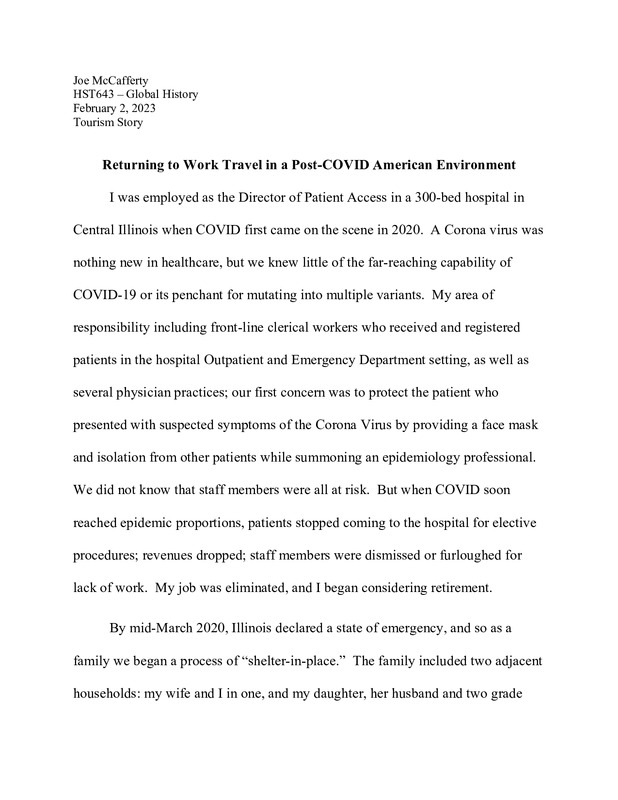 2020-02-23
2020-02-23Return to Travel After Covid
Enduring COVID restrictions impacting travel. -
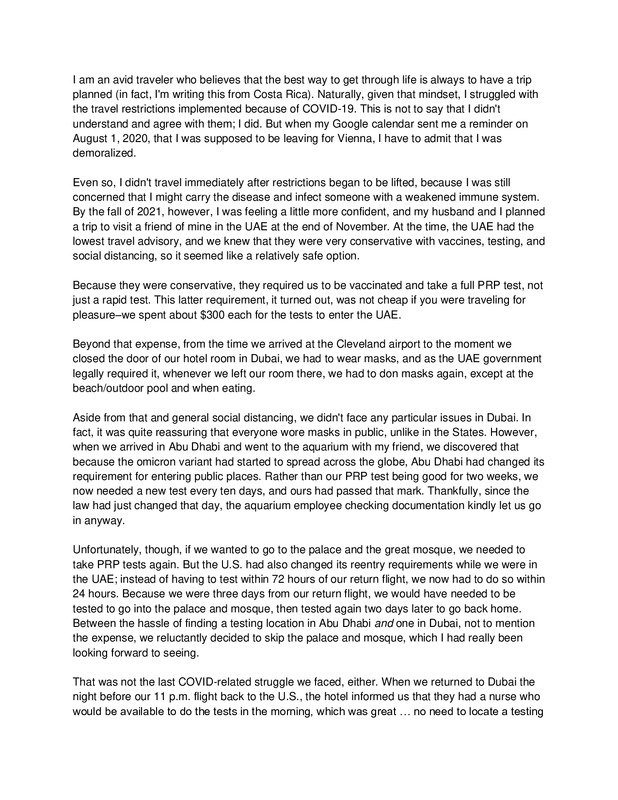 2021-11
2021-11Masks Aren't Meant to Be Worn for 38 Hours Straight
My first trip post-Covid was greatly affected by Covid-19, from expensive tests to missing two national landmarks to a flight delayed by lack of crew to wearing a mask for nearly forty hours straight. I was finally able to travel again, but the signs of the pandemic were still everywhere. -
2021-05-03
Business As Usual
I am a software engineer at a small, fairly conservative, company in PA. Because of its small company status it was never required for our employees to work from home, at least that was what they told us, and throughout the pandemic it was in fact a requirement that we work from the office. I wasn’t surprised when I was told I would be traveling to Washington state but I was apprehensive. A few of our employees were getting stick but I had so far been safe. On May 3rd 2021 I drove to the airport with a mask on my face and hand sanitizer in my hand. The airport was fairly empty as it was early but the few people that wandered the terminals were wearing masks. My flight was long but I got some sleep with the help of some Dramamine. That night my coworkers went out to eat but I decided to order in. The next morning I headed downstairs to head out for my first appointment. At the registration counter there were brown paper lunch bags sitting out in a neat row, the woman behind the desk asked me if I would like a breakfast bag to-go. As I walked over to pick up one of the bags she explained to me how due to Covid-19 they are not longer serving a hot buffet breakfast but are instead were providing this to-go bag options, I smiled from underneath my mask and thanked her. The bag had a banana, a granola bar, a yogurt and a bottle of water. I drove to the meeting site and headed inside, there were few people around but I noticed no one was wearing a mask, I felt like my light blue mask was a huge neon sign directing everyone’s attention to me. When I arrived at the designated meeting room I set up my computer and prepared the demo while I waited for others to arrive. One by one they walked in, greeted me, shook my hand and took a seat. Still no one was wearing a mask or if they were it was not secured properly, I felt embarrassed being the only one with a mask on. Once everyone arrived I stood up and looked at the room, everyone was looking right back at me, waiting. I took off my mask and began the meeting. The rest of the week was more of the same and the trip home was uneventful. A few days after getting home I tested positive for Covid-19 and was finally allowed to work from home, at least until I got better. -
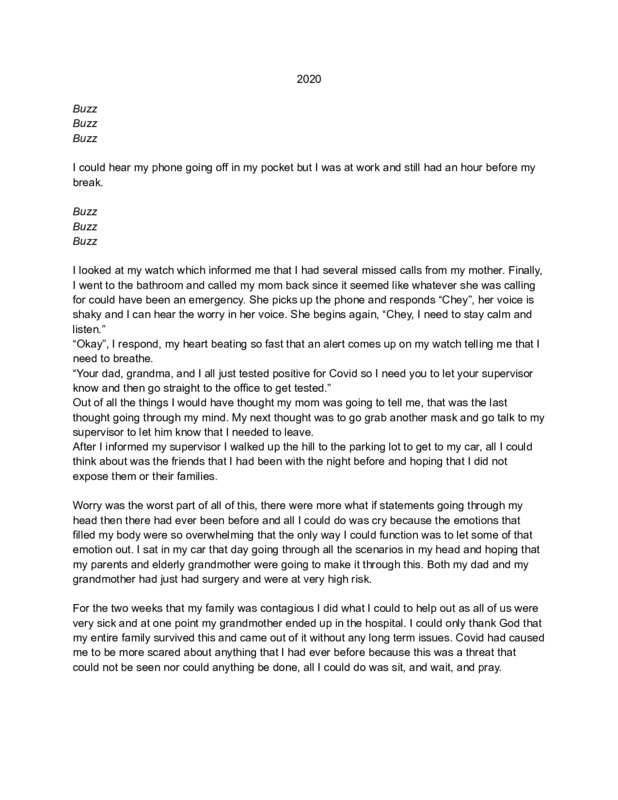 2020-06-21
2020-06-212020
This story shows my experience throughout the pandemic, it is important to me because it was an event that strongly impacted my life. -
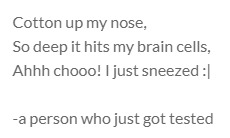 2021-06-23
2021-06-23The swab
Cotton up my nose, So deep it hits my brain cells, Ahhh chooo! I just sneezed :| -a person who just got tested -
 2021-03-21
2021-03-21Oral History: Interview with Anonymous Peace Officer #2
James Rayroux 0:01 My name is James Rayroux, and I'm a graduate student in global history at Arizona State University, and I'm working as a curation intern with the "Journal of the Plague Year" COVID-19 archive. Today is March 21, 2021, and it's just after 8:12pm or 2012 hours here in Arizona. I'm speaking with a narrator who wishes to contribute to the COVID-19, archive anonymously. Sir, I first want to thank you for speaking with me and contributing to this COVID-19 archive. Do you consent to having this interview recorded, transcribed, and immediately posted to the "Journal of the Plague Year" COVID-19 archive, where it will be made accessible to the public? Anonymous Officer 0:43 Yes, I do. JR 0:44 Thank you again for agreeing to speak with me and making time for this interview. In lieu of your name, or location, can you provide a summary of your background and professional experience in law enforcement? AO 1:01 Sure, I've been sworn law enforcement for almost 23 years in a state in the Rocky Mountain region. I've worked both for municipal and state government, and I work for small to medium sized agency now about 35 sworn officers. I'm a military veteran, I was US Navy prior to my time prior to going to the police academy, and I worked a variety assignments from patrol to drug and alcohol enforcement, auto theft Task Force, Joint Terrorism Task Force, supervision, criminal investigations, and command. JR 1:44 During that time what are some of your most prominent or important achievements within the law enforcement profession? AO 1:54 You know, I think that this profession, namely, is typically not about the individual. I would probably point towards successes in the community and successful team building and successful growth of individuals into the business. I think one of my most proud achievements I think, something I'm tremendously, I feel tremendously accomplished for is somehow I failed to convince my son to be a firefighter, and he was just sworn in at another municipality in the same state as a sworn law enforcement officer. So while I have failed him and trying to convince him to do literally anything else, I'm also extremely proud and accomplished that I have raised my son into a similar professional lineage, and he's elected to take the oath to protect his community, as well. JR 2:57 What are your current roles or assignments within your organization? AO 3:04 I'm currently assigned as a patrol supervisor, a watch commander. I supervise a shift of a number of police officers and currently working day shift. So in those roles, I'm essentially the emergency manager for our smaller community, supervise police response to emergencies, meet with the public, interact with command staff, meet with public stakeholders, and then, essentially, a customer service rep who happens to be a sworn law enforcement agent. JR 3:37 When and how did you learn about the SARS-CoV-2 virus in early 2020, and what were some of the first conversations you remember having about it at work? AO 3:51 So COVID became on the tip of everybody's tongue probably in early January. And previously, in the end of 2019, it was somebody else's problem. It was, it was a China problem, it was a Wu Han problem, specifically. It was, it was out of sight out of mind. And, of course, you'll know this about law enforcement, there's only two kinds of problems in law enforcement, those being "my problem," and "not my problem." And during the first part of 2020, it wasn't our problem. There was a limited amount of cases in the US, they trickled in. Most of what we understood about the virus that causes COVID-19 was based on the media, was based on, you know, what you might catch a snippet of on NPR on Fox News, which has no news about foxes, I might add, and essentially, just the snippets we would get on the media and I don't remember having official tangential conversations about the COVID-19 virus in a strategic way, until probably February. A lot of those initial conversations, you know, as, as trained observers and trained investigators, I know many, many law enforcement officers who don't immediately give a lot of trust or credence to things their government tells them. So, for the first little while, it was kind of an attitude of scrutiny, one of a lack of credibility. We weren't really sure whether this was hype and whether there was really any risk, and there was a lot of conversations about the corollary between, you know, the standard flu and other illnesses that killed just as many if not more people, and there was a lot of disagreement about their trajectory, and the volume, and the scope, and really how this thing was going to manifest. JR 6:04 How did your agency first deal with the COVID-9 pandemic in an official way? AO 6:12 The first steps that were taken initially, mostly just surrounded, strategic outward facing changes to how we did business on the street, basic social distancing, wash your hands, don't touch your face, basically just mimicked CDC advice. You know, be careful more to come. Very low level, very basic, no real operational changes, no testing, no recommendations for symptoms that was, you know, under the umbrella of "flatten the curve," keep yourself healthy sort of jargon, that was shared from both the government and from the administration of our, our small community downwards towards the police department and other, other trades in the region. JR 7:13 What did your first pandemic briefing or roll call look and feel like after those changes were made? Where you and your squad entirely in masks for that first time, or was that yet to come? AO 7:29 When the government of our state first mandated masks, there was specific legislation that excluded law enforcement. It was quickly decided that masks were recommended, but were not required initially. So there was this sort of juxtaposition and feeling out period in our community where not a lot of people wore masks. It was recommended. You were supposed to wear them when you were outside, you were supposed to wear them, you know, when you were in contact with others. The science hadn't really been affirmed. There weren't a lot of links to credible research yet. And, of course, a pandemic of this nature has never been experienced or dealt with for generations previous to this. And so, you know, I'm 100% cofident telling you that literally everyone was just winging it, and that was immediately apparent in that first briefing where we discussed what we were going to do. Still scrutiny, still somewhat lack of credibility, lots of, lots of eye rolling with a few critical and strategic thinkers, you know, raising, you know, what would later be the first semblance of some alarm, saying, "Hey, you know, maybe, maybe this is going to be a big deal. Maybe we haven't experienced anything like this before, we ought to be as careful as possible." JR 9:03 How did your agency's policies and procedures change over time after that initial effort? AO 9:13 So the, you know, the, the tide came in, in a big way very quickly. And as you'll remember, as the COVID-19 virus, sort of sieged Italy and New York and the Eastern Seaboard, everybody started paying attention in a big way. And we're, you know, a couple 1000 miles from there, but local and state governments started reacting very, very quickly. Masks were mandated for all persons in contact with the public. A scramble was afoot to obtain PPE [personal protective equipment], which supply chains being, you know, any resemblance of the way they were in 2019, there was no problem. You just got on Uline or Amazon or, you know, you know, whoever your main commercial supplier was, and you ordered them by the skid and PPE was readily available and there was no reason to hoard it. But all of a sudden, there weren't any. There wasn't any, the supply chains were just curb-stomped into this sort of perpetual waiting period where nobody was sure what they were going to need, and everybody thought that N-95 respirators were the new hotness, and everyone had to have some from car dealers to people working the drive thru to baristas to, you know, the guy doing my front end alignment. So all of a sudden, we were trying to balance what was practically happening on the street, what our day-to-day call volume looked like, and what we were really supposed to do with the PPE we had knowing that our resupply was probably distant. And when we wove all that together and put all that minutia in a pot and stirred it up, what we came up with was pretty much this overwhelming sense of nobody knowing anything that was reliable. And it was anybody's best guess how long this was going to last and what we're going to need. That was echoed among our local hazmat [Hazardous Materials responders], our local health departments, our local health organizations. Nobody had any PPE to give us, nobody knew how long it was going to last, and nobody could have any real recommendations except for this sort of parroted, you know, don't touch your face, wash your hands, wear a mask in contact with everybody. Once masks were required, we had some pretty significant changes to the way that we did business in the community. You know, as a forward facing law enforcement agency, we contact, you know, one officer might contact 10s of people every day, sometimes might make 15 or 20 contacts before, you know, the afternoon's said, and by doing so, what we know now to weave a fabric of a contact trace that is essentially impossible. I mean, we remove Degrees of Separation all day long just by talking to people. And none of that technology and contact tracing and science had really entered the social jargon. But we were out there just trying to be as careful as possible, and it wasn't until probably...probably late March is when you know rivers turned to blood and the sky fell as far as the government was concerned. And it was then that definitive, codified changes were made to procedure where there was a moratorium put on traffic enforcement and all proactive street contacts, except for egregious emergency violations. We didn't make traffic stops for weeks. There was a moratorium immediately placed on warrant arrests and on booking people at the jail because, having a potential infectious patient in your vehicle, nobody knew what the consequences of that were or how to decon [decontaminate] it. So we didn't arrest anybody. If it was a crime of violence, or a crime against a person with a victim, we would screen it at the jail first. Everybody warned N-95 mask, and we would transport them as quickly and safely as possible. If it was a warrant for anything nonviolent, warrant for bench warrants, and courts and anything, we just let them go. Even if somebody told us that they had COVID symptoms, or were COVID positive, there was still no viable testing in the system, and no way to confirm or deny that those statements were true so we didn't book them. So many suspects in cases either went uncontacted, cases were dismissed, or the warrants were skipped just because the precautions weren't in place yet, and the agency and all the businesses and other agencies we worked in the region were trying to just to stay healthy. Proactivity probably took a, I think, I would call a permanent shift. I have not seen a resurgence of practice enforcement and the likes of which I might like. Cops just stopped doing business the way that they used to, and some of the badges we'd wear and some of the honor that we took in protecting the community came from making contacts: suspicious vehicle, suspicious people, you know, local transients, patrolling, you know, bike racks and stealing cars and stealing bikes and harassing people and it, it turned into kind of this proactive wasteland where law enforcement was worried about exposing themselves. They were worried about exposing each other. They were worried about exposing their families. And they were worried that if they happen to make a contact, they might expose the next people, the next 10 or 15 people that they talked to that day. So the only way to eliminate that was just to stop doing it. So by eliminating, you know, the patient zero style traffic stops, we hoped to have an impact on that, and flatten our own curves by just not talking to anybody unless it was an emergency. JR 15:38 Do you remember the first call or the first contact that you went on where you and the public were both wearing masks? AO 15:51 I don't remember it specifically. But I remember a handful of contacts that were made in right around March when, you know, when I said that when the king tide came in with news and with panic and fear. And I remember a handful where nobody really was sure what to do. Everybody was, had this sort of weaponized social distance, and people would walk the other direction when you tried to talk to him, and we hadn't mastered the, you know, the little elbow bump or the little nod, and so nobody could figure out how to talk to one another, and there was quite a few instances of the COVID card being played where people just simply didn't want to talk to the police. So they, they feigned fear and panic for exposure and wouldn't come out of their homes and open their car doors or their windows. And then shortly thereafter, it became socially stigmatic to participate in the fear and panic. And if law enforcement didn't wear masks, we sort of became this pariah immediately. So it was, it was optional for a very short period of time, but then very, very quickly, virtually every single contact we made had to have a mask on, of course, which, you know, brings with it all the problems associated with not being able to see somebody's face. It's hard to hear, it's hard to talk on the radio. It's hard to smell intoxicants, you know, it just added sort of this, it was basically like dimming the focus one click on your whole world by having to cover your face. But, you know, at that point, some of the science was starting to become more consistent and more published, and every, most everybody at that point was pretty convinced that at least when in contact with the public and the unknown, that some sort of mask was viable and necessary. JR 17:50 In Western society, handshaking has long been a very important social event. And that's obviously gone by the wayside with the general public since the pandemic began. In lieu of having that physical contact to make direct human connections, how have you tried to establish rapport with the public when you do have to contact them? AO 18:21 It's been weird. You know, handshakes have been sort of the status quo of a show of respect and humility for so many years. I mean, you know, you hold your hand out, it's almost instinctual. It's almost primordial. You know, in this culture in Western culture, someone holds your hand out, and you don't take it, like, them's are fighting actions, right? So it's, it was weird. We had to figure out ways to break the ice, we had to figure out ways to do that acknowledgement, and I'll answer it two ways. The first way was we had to figure out how to communicate with people even though they couldn't really see our faces, and there could be no sort of context to breaking sign of respect, like the handshake. So you know, you come up with this weird elbow bump, or you give the little, you know, the little nod that one bro gives to another across the urinal, and you find out ways to just break the ice with people. And the second challenge that we experienced was that we could no longer show those signs of respect to one another in view of the public. So if one cop was touching another, or, you know, giving a little handshake or playing grab ass, or high five, or even just a fist bump, all of a sudden, we were cast out, right? All of a sudden, those little, that that lack of social distancing became this socially virtuous thing to exploit and to ridicule, and so we had to be exceptionally careful in public even though within shifts, we considered our shifts to be close contact circles. I mean, any sworn law enforcement officer working during the COVID shutdown very likely saw their shift mates more than they saw their blood families. And so there was just no way to socially distance internally at work, because of the, just close knit manner in which the job is done and the proximity we had to one another throughout the day. Yet in public, you know, we're in our own cars we're socially distanced, we got to have masks on, you better boil yourself between each contact, and you got to wear booties and a Tyvek suit and touch everybody with a little wand. And in the mix, I feel like our isolationism increased, and I feel like our bonds of society from a law enforcement perspective became even more tenuous. So, you know, one of the things I adopted was I started using my first name with everybody. I stopped using rank, I stopped using identifiers. I just told him who I was. I asked them for their first name, I use my first name, I tried to break it down. And I would always, you know, have these little catch conversations I do and I introduced everybody, and just try to acknowledge that this is a new time and, you know, you hear in the media and you see it a lot. And in every, every, you know, corporation, commercial for six months, it was, "in these trying times." So, that sort of became the catchphrase like, "Hey, in these challenging times, things are different. Here's the business I'm here to do. My name is so-and-so. We're trying to keep the peace, how can we be helpful?" And we interacted with all kinds of people. Some people thought it was a hoax. Plenty of, plenty of sovereign citizen scam-demick, plan-demick jargon being thrown our way. And then on the other side of that spectrum, were extremely scared, extremely isolated...people wouldn't come out of their houses, people were afraid to take a Grubhub delivery. People were, you know, boiling their utensils. And somewhere in the middle, law enforcement just kind of figured out a way to break the ice, and I think it's, I think it's going to be permanently different. And I can tell you that because the day before yesterday, I was on a burglary call where I talked to the informant. Without even thinking, I reached my hand out to shake his hand because he told me his name. He said, "Hey, thanks for coming. I'm so and so." And without even thinking about it, my mammal brain shot my hand out in a greeting. And it took him about five seconds of staring at me before I figured out that we just don't do that anymore. And it's super weird, but we, we're working around it. JR 22:51 What do you miss most about your job or your daily work duties from 2019? AO 23:02 You know, I don't know if this is going to be directly related to the pandemic. I think that in 2019, we were dealing with a community that understood what the rules were. Everything was, you know, we call it "pre-COVID," we call it "olden days," I don't know if we're ever going to return to those times, but cops are out there doing business in the community, and we were fighting crime and protecting people. And we were making this self sacrifice and serving our community and being forward facing and just eatin' meat and just leaning in just to get business done. And we did it no way that served our customer and served our client base. And I don't know any law enforcement officer who's been on the job for more than 10 minutes who doesn't do this because they love the community they work, or they love the service that they provide, or the people they protect. And I think we've permanently changed the way that law enforcement officers are viewed by their communities. I think we've done, and I say "we," I mean we as a culture, good, bad, or indifferent, have done irrevocable damage to the reputation of law enforcers in our community and the public trust that they must hold in order to be successful. And then all of a sudden, the communities "why nots" became really, really strong. And cops had to start making excuses really quickly about why we weren't the bad cops. And why we weren't doing this to violate your civil rights. And why we're just, we're just out there trying to do the job and just trying to, you know, serve policy and serve the constitution and it might not be about you and your mask. And I feel like this stigma, the social stigma became leveraged against law enforcement in a really big way without any real underlying facts. No one, you know, it just became this sort of socially virtuous stigmatic status to hate the cops, whether it was for their efforts to preserve the public peace in the pandemic, or whether it was your interpretation of their worth based on events taking place in the national landscape. It became cliche to hate the cops. And I think I miss, I missed the real relationships we had in 2019 that were based on sort of a shared respect, and a common understanding and actual virtues of character and integrity. And now, you know, it's, it's an uphill climb. We're sort of this Sisyphussian rock-pushing force, just always trying to push this public opinion and public trust rock up the hill only to, you know, take two steps back, and I miss that quite a bit. JR 26:15 What do you wish that the public understood about law enforcement during the COVID-19 pandemic? AO 26:27 I think if I could choose one thing, I wish that the public understood that nothing changed in the way that law enforcement supports and loves and wants to collaborate with the community. During the pandemic, law enforcement was shined in three or four different colored lenses varying from, you know, rosy to catastrophic, and most police officers on the street during the pandemic, were humans just trying to figure out how to navigate their space and provide for their families, and to continue to protect the public and somehow navigate shark infested waters of this, the sudden unknown COVID-19 enemy. And it was a huge struggle, you know, policy was changing on the daily. Science and procedure was being released several times a day at, you know, at its busiest, and most law enforcement were just caught in the wake of this rapidly changing information, hugely volatile work environment, and trying to keep themselves and their families healthy while still being effective. I wish the public knew how much most law enforcement officers hate racism and prejudice and corruption. I wish they knew that nobody hates dirty cops more than we do. And that virtually all the law enforcement officers they contact on the daily are still doing the job because they've considered the risks to their lives and their risks to their health and the risk to their family's health, and are still willing to suit up every morning or every night, and put body armor on, and put 30 pounds of gear on, and go out there and risk their health and safety to protect our community, and mostly people they don't even know and have never met. And I think that's what's really at stake when the rhetoric gets really loud and the disinformation gets really deep. And the panic and the fear really starts to grab older people is they start to lash out against the government as a whole and what they don't understand in, you know, in some way is that that uniform represents just another member of their same community who is trying to stand between the two entities and make good decisions, and protect the constitution and uphold the peace and protect the, you know, the victims and protect, you know, the weak from the oppression and you know, all the things we stand for. But all those cops out there are just the same community members. Some of them don't have any toilet paper at home. Some of them couldn't buy peanut butter. Some of them didn't have fresh food for weeks because they couldn't go to the grocery store because of their shifts. So it wasn't that there was this divide. It wasn't that there's this this pantheon of law enforcement officers who were out there trying to screw everyone, it was members of the very same community who just happened to put that uniform on by choice to save it and protect the community despite the fact that there was this, you know, this crazy pandemic and all the fear and panic going on at the same time. JR 29:56 Knowing that I intended to speak with you about law enforcement and your experience in that profession during this pandemic, what, perhaps, was one of the questions that you hoped to answer or that I didn't ask? AO 30:18 One of the things I was thinking about talking about was that, for the first several weeks, I would say maybe even two months, there was no viable testing for any first responders in our region. So if one of my guys or gals was symptomatic, they simply had to be quarantined, and there was no way to test. We begged and borrowed and pled, and, you know, by hook or by crook, tried to figure out how to make a relationship with a clinical entity so that we could protect our people and keep them in place and keep them effective and keep them assigned on the street. What happened was any flu-like symptoms were just viewed as COVID quarantine, and so there was a couple of days there where I almost didn't have an emergency dispatch center because I didn't have anybody to work. There was a couple of days where we were hemorrhaging overtime money paying the cops that were healthy to cover the cops that were not because we couldn't get them tested. It took quite a while until we had a viable, and until the turnaround was fast enough that it was sustainable to test people. Because if the turnaround was 10 days, and the quarantine was 14 days, and almost was you know, half a dozen, six of another, you were gonna stay home anyway. So until the testing was fast enough and efficient enough, we burned a lot of time, and a lot of cops sat at home for 14 days under quarantine who maybe didn't mean to, and there was no way to test them. Once testing was viable, and available, I feel like we did a better job of that. But at the beginning, there were several of us who were pretty sure we had contracted the virus and suffered its effects as early as January or February, a ton of us were sick in January and February and early March before, way before viable testing was available in our communities. And that was, that was a challenging and an alarming period of time where even my first responders we just didn't know. And if you weren't admitted to the ER, if you weren't seen clinically, and if you didn't have co-morbidities or other risk categories, you just didn't get tested because the resources didn't exist. And why would we waste a test on a first responder who can just quarantine for two weeks and be otherwise healthy when we need to use it on, you know, the septuagenarian co-morbid patient who's, you know, got 15 different ailments, and I understand that math. But it was pretty frustrating to just have to hemorrhage overtime money and just suffer and figure out how to cover shifts and work 16, 18 hours in a row because there just wasn't anybody else. JR 33:23 I am incredibly grateful for your time and for sharing your expertise and your thoughts with us. Thank you so much. AO 33:31 You're very welcome, sir. Thank you for the opportunity. Transcribed by https://otter.ai -
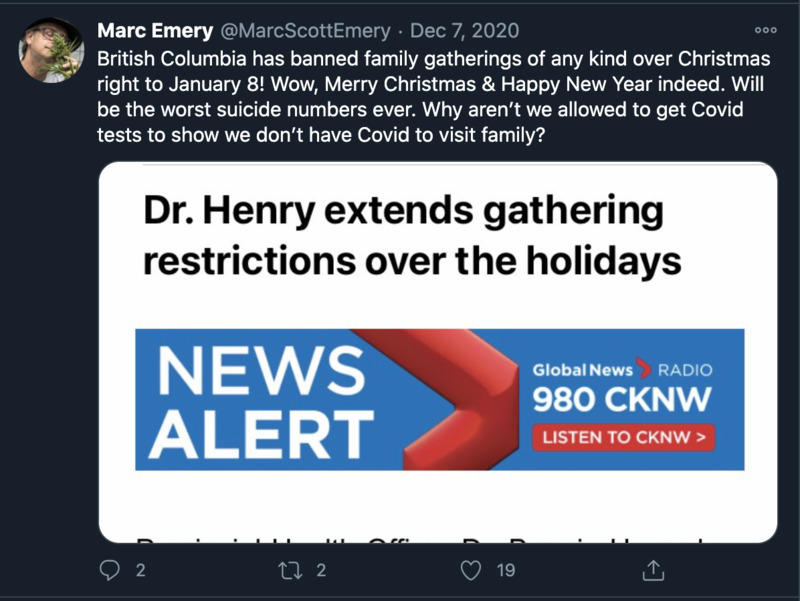 2020-12-07
2020-12-07Dr. Henry extends gathering restrictions over the holidays
Tweet: "British Columbia has banned family gatherings of any kind over Christmas right to January 8! Wow, Merry Christmas & Happy New Year indeed. Will be the worst suicide numbers ever. Why aren’t we allowed to get Covid tests to show we don’t have Covid to visit family?" -
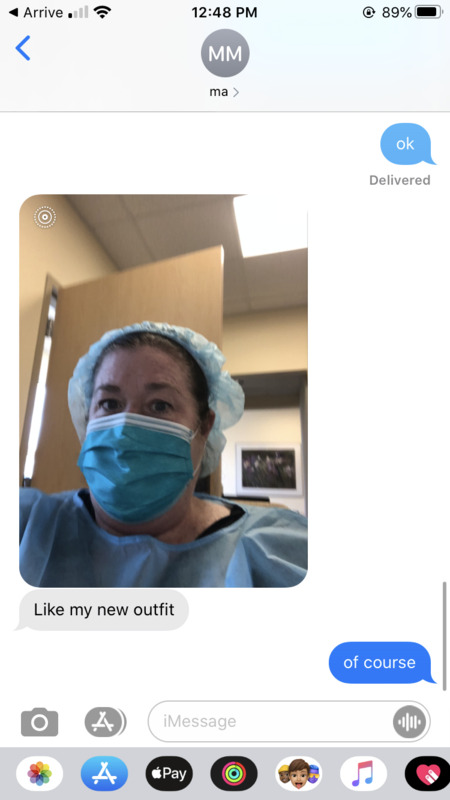 2020-03-19
2020-03-19Text Messages between my Mother and I.
This is a small conversation between my mom and I when she went back to work during the beginning of quarantine. She works as a medical secretary at a local doctor’s office and works closely with sharing phones, computers, and other spaces. It was not until recently that there was a COVID scare following Thanksgiving, but, she tested negative since they are from a different department. This item connects to the week focusing on historical thinking on and off the web as this was never something that I would have considered sharing beyond my close group of friends since it feel mundane now. I think that this is an “Item of interest to future historians that helps illustrate something particularly significant about the year 2020” as we see her in full gear. While the precautions no longer have the dress or hair mask, she still wears the medical-grade mask with her gloves and face shield each day. Seeing people in action will humanize the pandemic and make it seem like something that truly happened than just another historical moment with accounts like this. -
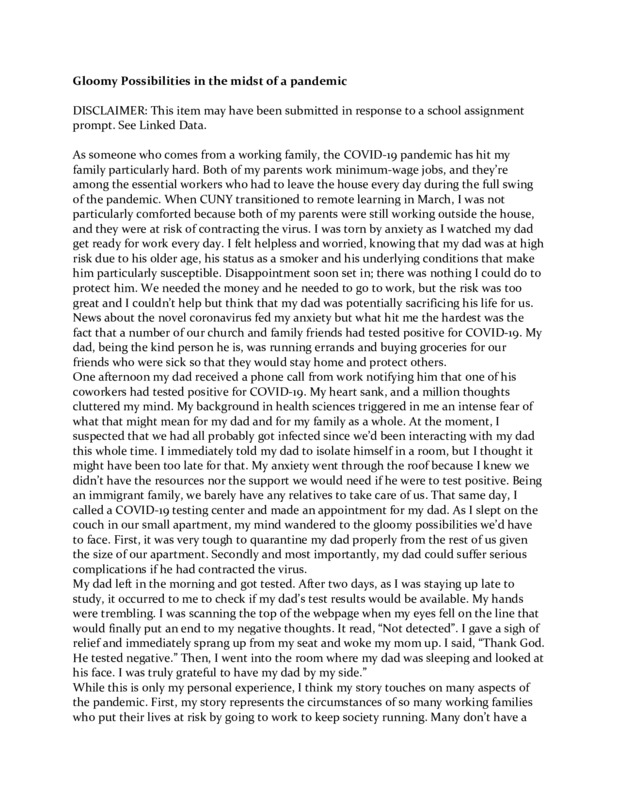 2020-05-20
2020-05-20Gloomy Possibilities in the midst of a pandemic
As someone who comes from a working family, the COVID-19 pandemic has hit my family particularly hard. Both of my parents work minimum-wage jobs, and they’re among the essential workers who had to leave the house every day during the full swing of the pandemic. When CUNY transitioned to remote learning in March, I was not particularly comforted because both of my parents were still working outside the house, and they were at risk of contracting the virus. I was torn by anxiety as I watched my dad get ready for work every day. I felt helpless and worried, knowing that my dad was at high risk due to his older age, his status as a smoker and his underlying conditions that make him particularly susceptible. Disappointment soon set in; there was nothing I could do to protect him. We needed the money and he needed to go to work, but the risk was too great and I couldn’t help but think that my dad was potentially sacrificing his life for us. News about the novel coronavirus fed my anxiety but what hit me the hardest was the fact that a number of our church and family friends had tested positive for COVID-19. My dad, being the kind person he is, was running errands and buying groceries for our friends who were sick so that they would stay home and protect others. One afternoon my dad received a phone call from work notifying him that one of his coworkers had tested positive for COVID-19. My heart sank, and a million thoughts cluttered my mind. My background in health sciences triggered in me an intense fear of what that might mean for my dad and for my family as a whole. At the moment, I suspected that we had all probably got infected since we’d been interacting with my dad this whole time. I immediately told my dad to isolate himself in a room, but I thought it might have been too late for that. My anxiety went through the roof because I knew we didn’t have the resources nor the support we would need if he were to test positive. Being an immigrant family, we barely have any relatives to take care of us. That same day, I called a COVID-19 testing center and made an appointment for my dad. As I slept on the couch in our small apartment, my mind wandered to the gloomy possibilities we’d have to face. First, it was very tough to quarantine my dad properly from the rest of us given the size of our apartment. Secondly and most importantly, my dad could suffer serious complications if he had contracted the virus. My dad left in the morning and got tested. After two days, as I was staying up late to study, it occurred to me to check if my dad’s test results would be available. My hands were trembling. I was scanning the top of the webpage when my eyes fell on the line that would finally put an end to my negative thoughts. It read, “Not detected”. I gave a sigh of relief and immediately sprang up from my seat and woke my mom up. I said, “Thank God. He tested negative.” Then, I went into the room where my dad was sleeping and looked at his face. I was truly grateful to have my dad by my side.” While this is only my personal experience, I think my story touches on many aspects of the pandemic. First, my story represents the circumstances of so many working families who put their lives at risk by going to work to keep society running. Many don’t have a choice but to continue working amidst the dangerous conditions. Here’s the reality, the pandemic has disproportionately affected those with low socioeconomic status either because they’re unable to stay safely at home or because they lack access to healthcare and other resources, which contribute to poorer health status overall. As someone studying health sciences, I’m interested in looking at the association between socioeconomic determinants and health outcomes. The pandemic has shed light on certain inadequacies that we could hopefully remediate in the future. This experience has taught me to appreciate my loved ones more than ever, and it has shown me that we should stand with each other in times of adversity like my dad did with his neighbors. While I was lucky that my family and I were healthy, the panic of a potential loss gave me a taste of what my community has been going through. My heart aches for the families that lost loved ones to the pandemic and particularly for those who had scarce resources to protect and support themselves. -
2020-03-23
Mystery Virus
In late March of 2020, I came down with a terrible migraine. Now, I get migraines a lot, at least once a week, but they usually go away with some naproxen or a nap conveniently timed around when it would be a more responsible decision for me to be doing my homework instead of sleeping. This migraine lasted for a full week. Standing up made my vision go blurry, and any light or noise would cause intense throbbing behind my eyes. It felt like my brain was swelling up and knocking on my skull walls begging to be released from my head. I spent most of my time splayed out on the living room floor covered in blankets with ice packs propped up around my head and neck to try to soothe the pain. I scheduled a tele-health visit with my doctor and she told me since migraines aren’t uncommon for me that I should just wait it out and drink lots of fluids, so I waited, but then I caught some mysterious virus which seemed to have a personal vendetta against my tonsils. My tonsils got so huge. They swelled up so much that even drinking became difficult, and very quickly a thick film of white gunk started to grow all over the back of my throat. I had a fever, chills, and a sore throat. Usually at that point I would go into the doctor’s office and get a strep swab, but this was during the second week of full lockdown in the US and doctors were not seeing patients in person. After multiple attempts to send my doctor precariously-angled photos of the back of my throat, they decided that if after a few more days of drinking fluids I still felt sick, I needed to go to the ER simply because it was the only place that was open in town and they could give me some tests. Going to the ER during the first wave of COVID-19 was absolutely terrifying. The first thing I saw when I pulled into the parking lot was the abundance of signs listing the symptoms of COVID-19. There were multiple entrances, one for people who had no symptoms, and a literal shipping container full of testing materials and staff in extensive PPE for those who did. I was just there for a strep test and someone to make sure I didn’t have mono or meningitis, so I went through the normal entrance. After triage, two nurses fully dressed in hazmat suits came up to me. They told me that since I had had a fever within the past few days, I had to be brought to the COVID-19 wing of the hospital. They took me outside to a golf cart where another hazmat suit-wearing driver drove me down to the basement level of the hospital that had not been part of the hospital in years but reopened for the sake of coronavirus. It honestly seemed like the doctors and nurses were bored and had nothing else to do because over the next few hours I had about ten random medical staff come poke and prod at me in my room. They took blood samples, shone lights into my eyes, and stuck probably the longest swab I have ever seen up my nose to tickle my brain for any COVID-19 particles. Hospitals are scary places to me and being surrounded by nurses and doctors decked out in layers of wearable plastic made me feel even more uneasy. I knew they were being safe, but it was difficult to stay calm when I couldn’t see the faces of the people I while being treated by. Eventually, they decided I had an intractable migraine along with something else and gave me shots of sumatriptan which made me drowsy. All of the tests came back negative and I was told to go home and, once more, drink lots of fluids. After another week on the couch and endless cups of tea, my mysteriously giant tonsils finally calmed down and my migraine decided it was bored of torturing me. I am extremely grateful that I did not have COVID-19, but it was an incredibly strange experience to have to receive relatively serious healthcare unrelated to COVID-19 during the pandemic. Even more than that though, I am so grateful for the healthcare workers that put their lives at risk for people in need every single day. -
2020-06-20
Pandemic Paranoia
Around June, which was around the time the virus got really bad in Los Angeles, my hometown, my brother's friend tested positive for coronavirus. At the time, I was going to work every day at an ice cream shop by my house, seeing dozens of customers and working in close proximity to my fellow teenage coworkers, who all went home to their families. My brother had interacted with his covid-positive friend outside and with masks; the friend's parents had both tested negative. It was probably a false positive. I remember getting the call from my dad that Ben tested positive. I left work immediately and drove home, trying not to think about what I would do if my parents died. I would consider myself a rational person. I knew that the chances of my brother having it were extremely low, especially because my mom had called multiple doctors that morning to ease her mind. I called every person I'd interacted with even slightly. I told my boss that I couldn't come to work and sat at home trying not to panic. Of course, his test came back negative a couple days later. -
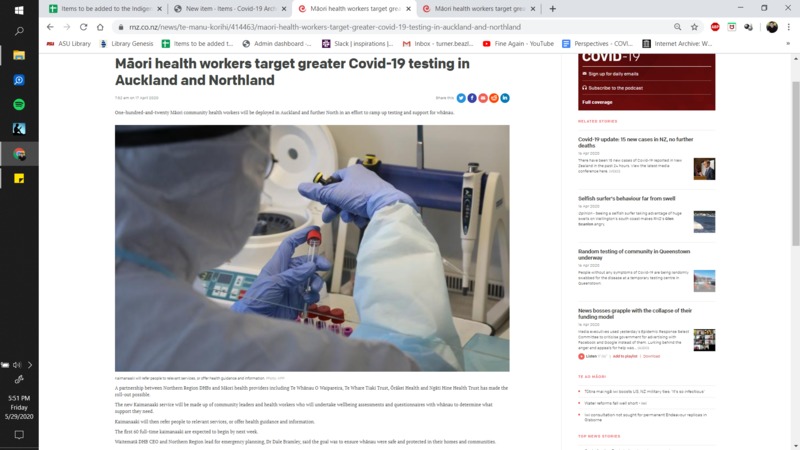 2020-04-17
2020-04-17Māori health workers target greater Covid-19 testing in Auckland and Northland
"One-hundred-and-twenty Māori community health workers will be deployed in Auckland and further North in an effort to ramp up testing and support for whānau." -
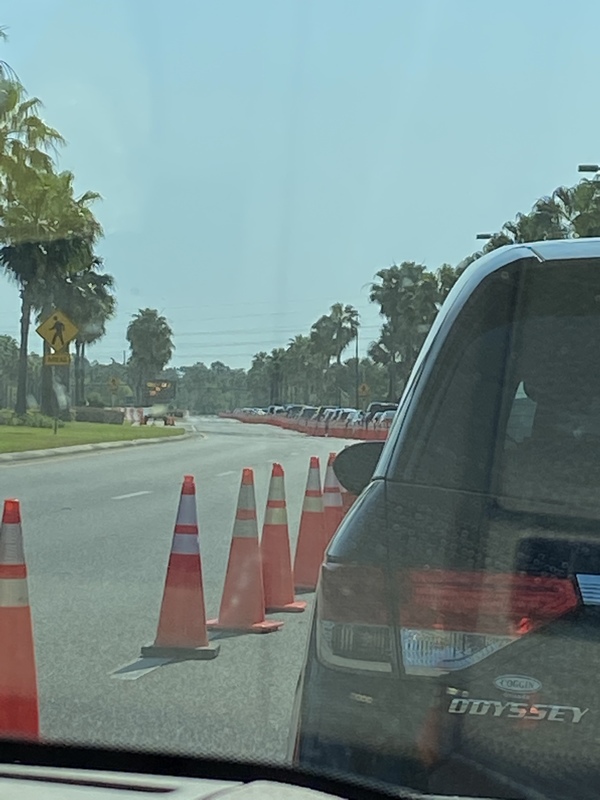 2020-04-04
2020-04-04Hours wasted in line for Covid-19 testing in Orlando Florida, still only open with many restrictions
You still need to have a fever and be in a high risk group to get in a huge line for the potential to get one of the 250 tests available daily for all of Central Florida. #HST643 -
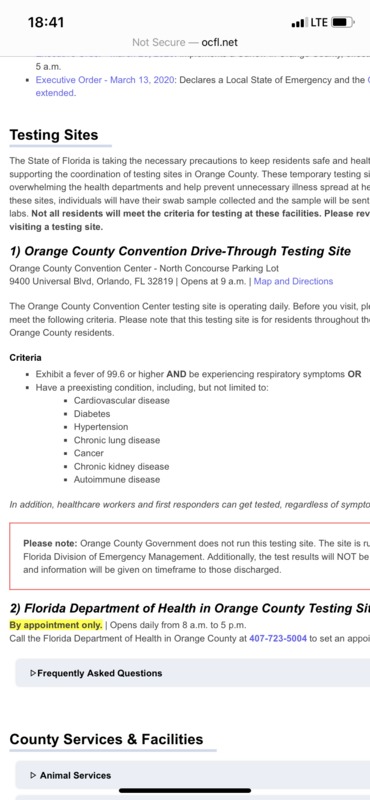 2020-04-03
2020-04-03Florida Testing site finally dropped the 65 and over age requirement for testing. We are going to try now.
The drive up testing site is finally open to those under the age of 65 with a fever and symptoms. My wife and I will try for a week to get tested because there are only 250 tests per day and thousands of cars lined up by hours before they open. #HST643
